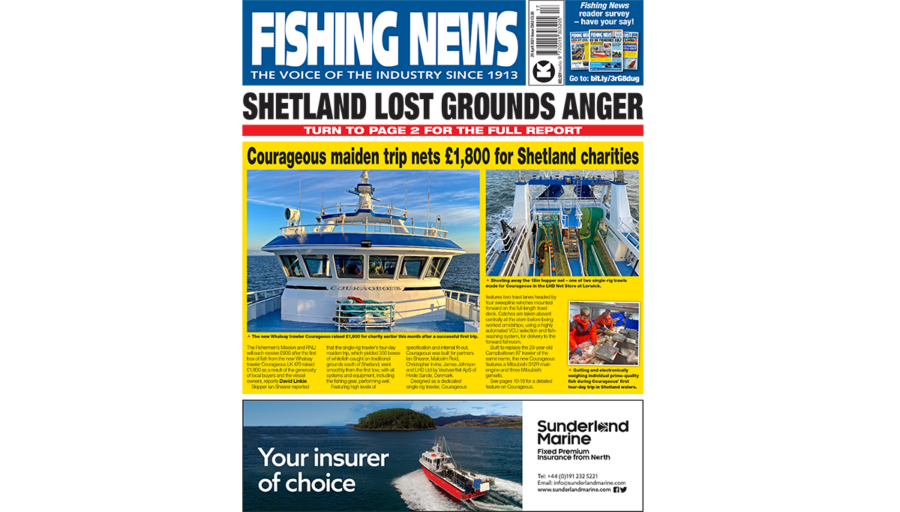Call for Scots government to act
Shetland fishermen want the Scottish government to take action against large fleets of foreign gill-netters working off Shetland, reports Tim Oliver.
They say the vessels close off large areas of their traditional trawling grounds and are aggressive towards local boats. They also send all their catches back to their home countries and bring no benefit to the local economy.
The problem is longstanding, and until now the Scottish and UK authorities have been unable to act because the vessels were working legally outside the UK 12-mile limit.
But with the UK now an independent coastal state with its own 200-mile EEZ and the ability to control who fishes in UK waters, the Shetland fishermen are calling for action.
James Anderson, chairman of the Shetland Fishermen’s Association (SFA), told BBC Radio Shetland that local fishermen want to see legislation put in place to stop or restrict the foreign netters in the areas Shetland boats traditionally fish.
He said the problem had been made worse by the small cod quota this year. Shetland boats needed to fish in the waters where the gill-netters are working to avoid cod, ‘but when we get up there then we meet this large fleet there, sometimes flagships flagged to different countries’.
He said: “They are taking up a huge area, and one boat will take up 50 to 60 miles at the edge, and that’s totally disproportionate to the number of boats.”
He said just one boat can take up an area where half a dozen Shetland boats could be working. “One will just say: ‘You’re not fishing here – we’ve got the nets down now, and you can’t tow the nets away, and you can’t come here.’
“The law needs to change,” he said. “When we were in the EU, we were told you just couldn’t get it done, it’s going to be too difficult. You couldn’t even discuss it basically – but we’ve left now.
“They are saying they will do something. Marine Scotland has said again that they will look at it, so hopefully we’ll get something done.”
Asked if the Scottish fishery protection vessels could do anything, the SFA chairman said: “Just now, I don’t think they can, but they could be boarding, they could check them out.
“We’ve seen the data, and it shows that they haven’t been doing that. There’s practically no boarding of their vessels – but most of the boardings are the local boats, and I don’t know why that should be either.”
He spoke of the well-publicised incident last year when a Spanish-owned and German-registered netter, Pesorsa Dos, attempted to foul the propeller of his vessel, Alison Kay, with a rope. The incident was filmed and reported to the authorities, but the MCA said it could do nothing because the vessels were outside the UK 12-mile limit.
He said a few boats had been having difficulty in the past few days with aggressive tactics by the netters. “It’s not going to go away – they’re pretty tough, they keep going. They think they’ll keep going until we give in and they’ll get the area, but that hopefully won’t happen.”
James Anderson also pointed out that the foreign netters bring no economic benefit to the UK or Shetland region, where two new fishmarkets have been built at Lerwick and Scalloway.
“We’re looking at this as much through the local economy as we can, but when you get those boats that go and land in Ullapool or wherever – they leave their nets out fishing while they go – the fish they land has no economic gain to the UK, and then they come back again and keep going until it’s fished up, and then they move on.”
He told Radio Shetland that the UK/Scotland can now take management measures as an independent coastal state with full control over its EEZ out to 200 miles.
“Our own parliament can make that call and do it. They just need to have the will to do it,” he said. “Hopefully they’ll look at it and do something, because it just makes no sense that this could be allowed to keep happening. It wouldn’t happen in Iceland or Norway, no chance – so why should we let it happen?”
Asked to comment on the situation, Marine Scotland said: “We are now in the pre-election period, and as such the government news service is effectively suspended.”
But it referred to page seven of Scotland’s ‘Future of Fisheries Management – Policy Intent’ paper published in October 2020, which states: “We will introduce revised management rules in relation to the operation of gill-net and longline fisheries in our waters to better facilitate close working between static and mobile sectors. These measures will be set out in our future catching policy.”
For more up-to-date, in-depth news on the UK and Irish fishing industry, subscribe to Fishing News here.








